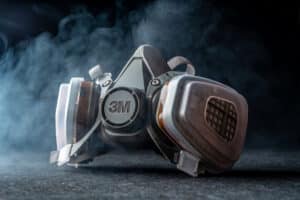Controversial Decision in Mesothelioma Case Raises Concerns Among Advocates
In October of 2022, mesothelioma victim Randolph McCabe filed a negligence lawsuit against 3M, alleging that the company’s 8710 model respirator that he used as a warehouse employee was defective and allowed him to inhale the asbestos that caused his illness. In response, the company requested genetic testing of Mr. McCabe’s blood, and the judge granted their request. The decision has raised significant concern among mesothelioma advocates.

Victim Points to Respirator’s Failure as Cause of His Mesothelioma
According to Mr. McCabe’s mesothelioma claim, he was provided with 3M 8710 respirators when he worked as a warehouse employee for both Associated Insulation Company and Acuron. His later diagnosis with the asbestos-related disease was an indication that the respirators had failed, but in response to his claim, 3M filed a motion to order genetic tests of his blood.
Controversial Study Cited to Support 3M’s Argument in Mesothelioma Case
Malignant mesothelioma is caused by exposure to asbestos, and this fact has been the basis for causation in countless negligence claims against asbestos companies. In response, many of these companies have attempted to put forward evidence of a genetic basis for mesothelioma. These arguments are based on dubious science and have largely been dismissed out of hand.
In requesting a sample of the mesothelioma victim’s blood, 3M pointed to a mesothelioma study conducted at the University of Hawaii that asserted that mesothelioma was caused by a genetic mutation. Though this study has been widely discredited, the company’s attorneys requested a blood sample from Mr. McCabe to determine whether he had this specific mutation. They noted an indication from his lung biopsy that suggested that he did, and noted that in his deposition he had indicated he would be willing to provide such a sample.
Request for Blood Sample from Mesothelioma Victim Granted by Judge
Mr. McCabe’s attorney objected to the mesothelioma victim’s blood being submitted, noting that the studies the company was citing indicated that fewer than 50% of all the cases in the report had the genetic mutation they were looking for. They also pointed out that Mr. McCabe’s willingness to submit to the blood test specified that he would do so if it might improve his health. Despite these facts, Judge James H. Ashford allowed 3M’s request, causing alarm among both legal advocates and the research community.


FREE Financial Compensation Packet
- Info on law firms that will recover your HIGHEST COMPENSATION
- Learn how to get paid in 90 days
- File for your share of $30 billion in trust funds

